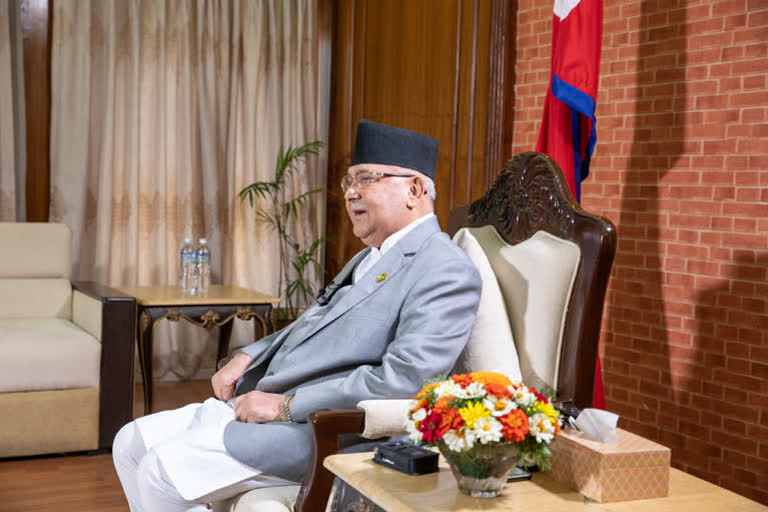New Delhi: In a flurry of developments in Kathmandu on Thursday, Nepal Prime Minister K.P. Sharma Oli, who is under pressure to quit within his party, met President Bidya Devi Bhandari following which she prorogued the ongoing Budget Session of the Parliament under a Cabinet recommendation.
With President Bhandari proroguing the parliament session, Oli can now avoid a vote of no-confidence on the floor of the house. Oli held a one-on-one meeting with Bhandari ahead of a Cabinet meeting which recommended proroguing the parliament.
Meanwhile, the Standing Committee of the ruling Nepal Communist Party (NCP) met again on Thursday in the absence of Oli to discuss his future. Kathmandu-based political analyst Hari Roka told ETV Bharat that Oli is now left with two options.
One is to resign either as Prime Minister or as co-chairman of the NCP.
“The last option for Oli is to split the party,” Roka told this journalist over phone from Nepal’s capital.
With more members of the NCP’s Standing Committee questioning his style of functioning on Wednesday, the Himalayan country’s Prime Minister K.P. Sharma Oli is now faced with more challenges to his post in the days to come.
Read: Nepal PM Oli holds cabinet meeting after ruling party leaders call for his 'resignation'
Though only five members spoke at a Standing Committee meeting on Wednesday in Kathmandu, all of them expressed their reservations about Oli’s continuance as Prime Minister, according to media reports.
While three of the leaders – Peshal Khatiwada, Matrika Yadav and Leelamani Pokhrel – demanded Oli’s resignation, two others – Nanda Kumar Prasain and Yogesh Bhattarai – urged him to correct his style of functioning, The Kathmandu Post reported.
The actions of Oli, seen as being pro-China, in recent times has put tremendous strain on India-Nepal relations.
Last month, Oli steered through the parliament a new political map of the country including Kalapani, Lipulekh and Limpiyadhura which fall within Indian territory. This came after Indian Home Minister Rajnath Singh in May inaugurated a road up to Lipulekh that has been built for pilgrims going to Kailash Mansarovar.
Following Oli’s move, India reacted with an External Affairs Ministry saying that it was “untenable”. Then on Sunday, Oli accused India of trying to dislodge him from his post of Prime Minister.
Read: Nepal's President signs bill to redraw map incorporating 3 Indian areas
“The activity in Delhi, a certain section of politics in Nepal and their collaboration is meant to dislodge me for my stance on the border dispute,” Oli was quoted as saying at a programme in Kathmandu on Sunday. “Nobody should think they will succeed in dislodging me.”
According to observers, Oli’s actions stem from opposition to him within the NCP for his poor handling of the Covid-19 pandemic in his country and he was using these as diversionary tactics.
On Tuesday, at a meeting of the Standing Committee, NCP co-chairman and former Prime Minister Pushpa Kamal Dahal “Prachanda” and senior leaders like Madhav Kumar Nepal, Jhala Nath Khanal, Bamdev Gautam and Narayan Kaji Shrestha, along with 11 other members sought Oli’s resignation as Prime Minister.
According to Roka, Oli is in minority within his own party with only 15 of the 45-member committee supporting him. “The PM is saying that if they continue to provoke him, he will split the party,” Roka said.
According to Roka, if Oli loses the prime ministership, in all likelihood it will be between Dahal and another former Prime Minister Madhav Kumar Nepal to share the posts of prime minister and chairman of the NCP.
The NCP came to power in 2018 following the unification of two leftist parties, the Communist Party of Nepal (Unified Marxist–Leninist) led by Oli and Communist Party of Nepal (Maoist Centre) led by Dahal.
Read: Nepal Parliament panel endorses bill to amend Citizenship Act
According to K. Yhome, Senior Fellow at the New Delhi-based Observer Research Foundation think tank’s Neighbourhood Regional Studies Initiative, there is an internal power struggle within the NCP with two clear camps and one camp supporting Dahal.
“The differences between the two camps got aggravated because of Oli’s handling of the Covid-19 crisis,” Yhome told ETV Bharat.
He also said that another reason for Oil’s overt aggression against India is China’s emerging role in Nepal’s political dynamics. “Nepal has played the China card in the past against India in the past but kept it hidden,” Yhome said.
“But what has changed is that Beijing is openly saying over the last two years that it is willing to play the game. That has changed the geopolitical dynamics in Nepal as far as India is concerned.”
China has started investing in hydropower projects in Nepal and a railway line from Kathmandu to Kerung in Tibet under Chinese President Xi Jinping’s pet Belt and Road Initiative (BRI).
On the other hand, there has been a surge in anti-India sentiments in the Himalayan nation after an economic blockade in 2015 that Kathmandu alleged was backed by New Delhi.
The Oli government capitalised on this sentiment and rode to power. This despite India being Nepal’s largest development aid partner and the two countries sharing centuries-old people-to-people and cultural ties.



